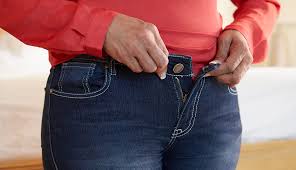 Remember the days where you could eat anything you wanted, drink soda by the gallon, stay out all night with your friends and you never seemed to gain a pound? Better yet, your body could take a beating in the gym and go through life’s obstacles and never showed signs of slowing down from aches and pains.
Remember the days where you could eat anything you wanted, drink soda by the gallon, stay out all night with your friends and you never seemed to gain a pound? Better yet, your body could take a beating in the gym and go through life’s obstacles and never showed signs of slowing down from aches and pains.
But now that you’re a bit older and you’ve seen your glory years fade into beautiful memories, your weight has begun to creep up on you — what gives? Why do the majority of people seem to gain weight as they become older? Is this simply a part of life that we must deal with, or is there something we can do to reverse the hands of time? Here’s what you need to know about how your hormones influence your weight fluctuations.
Why Do We Gain Weight in Adulthood?
Before we discuss how your hormones control your stubborn areas, we must first explore how our actions begin to shift and mold as we age. Do you work a 40-hour workweek? Are your weekends filled with chores and shopping for food that your family needs throughout the upcoming week? Have your dirty clothes begun to pile up in the corners of the laundry room?
If you answered ‘yes’ to any of these questions, don’t fret! Your younger years were, more than likely, filled with activities that got you out of your comfort zone and forced you to move. All of these little activities — running in the park, riding bikes, playing sports, jumping rope, playing in the woods — burned small amounts of fat throughout the day. Now that you’re in a professional environment and find yourself with numerous hours packed with errands and chorse, your human growth hormone, testosterone and serotonin levels have begun to dwindle. As we will discuss later, all of these factors contribute to stubborn fatty areas and weight gain.
Obesity and Most Dangerous Causes
The good news, and often the hardest to swallow, about gaining weight is that we can control it through lifestyle modification and healthy habits. According to an interesting study released by the U.S. National Library of Medicine, most individuals can directly link their weight gain and obesity back to inadequate exercise and increased caloric intake.
More importantly, obesity and excessive weight gain are directly related to life-threatening health issues such as the increased risk for heart disease, elevated blood pressure, risk of stroke and inadequate growth hormone levels. By making a daily commitment to remain active and opt for healthy food choices, you reduce your risk of health issues by a substantial margin.
Hormones and Fat Gain – What Is the Connection?
Now that you have begun to understand how your hormones play a fundamental role in your body composition, it’s essential to understand the mechanisms that occur below the surface of your skin. Leptin, a hormone responsible for signaling feelings of feeling satiated or ‘full’ after consuming a meal, has been shown to play a critical role in weight fluctuation.
For individuals that have a Body Mass Index (BMI) that falls within the healthy range, Leptin tells them that it’s time to put the fork down and finish eating their meal. You may often hear people exclaim that they feel “so full” and “couldn’t eat another bite if they tried.” That is what Leptin is responsible for. However, in adults that fall within the overweight range, this hormone dulls one’s sense of feeling satiated while consuming calories, and in many instances, causes them to overeat. As you can see, this is a recipe for rapid weight gain and unhealthy HGH levels.
Testosterone
In conjunction with the Leptin hormone, testosterone is the catalyst that helps us burn fat, build lean muscle, maintain focus, have boundless energy and maintain a healthy sex drive. Although we often hear about testosterone within the discussion of healthy males, this hormone is critical for females to stay in shape and lose unwanted fat. In fact, some food kills Testosterone, so our diet is pretty important to be attentive with. When testosterone production is balanced within the female body, it becomes easier for their body to repair connective tissue, maintain strong bones, regulate sexual desire and optimize recovery of reproductive tissue.
Scientists and medical professionals also find that the more overweight a person becomes, the less freely-available testosterone they have in their blood. When this occurs, it becomes difficult for the patient to exercise and maintain a sense of health as their weight gain continues. To counteract this issue, you should always strive for a healthy and lean physique so that your testosterone levels can balance in unison with your activity level. Remember that although these facts may seem daunting and overwhelming, you can reverse your hormonal imbalances one day at a time, one meal at a time and one exercise at a time. Always strive to improve your health and energy, one day at a time!

